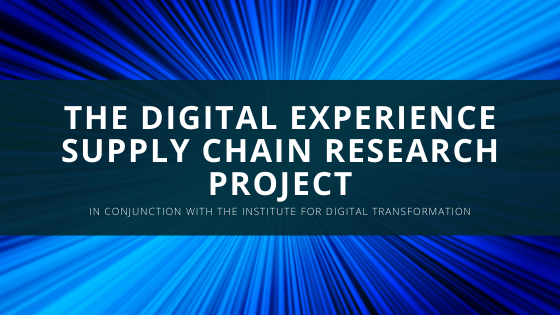
I have been researching digital transformation since 2014.
At the time, it was a little-used and ill-defined term. By that point, however, there was plenty of talk of so-called digital disruption and a growing understanding that non-digitally-native organizations must respond in some way.
However, the nature of that response was a subject of great debate.
Most importantly, the prevailing response was that in order to compete with digitally-native software companies, all enterprise organizations would need to become, in effect, software companies themselves.
This mandate was subsequently reduced to mean that digital transformation became synonymous with projects that served to digitally-enable existing non-digital business processes.
As I surveyed the evolution of how organizations approached digital transformation, however, what was striking was how little they were, in fact, changing.
The fundamental business models, operating models, and models of work remain unchanged.
Yet, as I studied the digital disruptors — the technology-centric companies that were challenging long-standing industries — what I found was that it was not so much the technology that was the agent of disruption. Instead, what I saw was that it was the ability of these disruptors to leverage technology to transform the customer experience that was, in fact, the driver of disruption.
I further observed that their ability to transform the customer experience was predicated on their willingness to accept entirely different forms of business and operating models.
What became clear was that just as industrial organizations required a supply chain in order to optimize the delivery of value in the Industrial Age, these disruptive organizations were, in effect, creating a new type of supply chain. This supply chain enabled them to create, curate, and sustain a customer experience that would allow them to serve a market in unique, differentiated, and defensible ways. They were creating what I would come to call a Digital Experience Supply Chain.
The Digital Experience Supply Chain
The digital experience supply chain is like industrial age supply chains insofar as the fact that it represents a value network that ultimately delivers value to the end consumer. But unlike traditional supply chains that took a product and moved it through a progression of steps adding value as it went in a linear fashion, the digital experience supply chain is an on-going an iterative capability loop.
In conjunction with Dr. Frank Granito, Chief Scientist of The Institute for Digital Transformation, we have decided to launch a research project to explore this concept and test its validity.
Our thesis is that for organizations to deliver differentiated customer value in the Digital Era, they must:
Curate and create a unique and differentiated experience for their customers.
This will, in turn, demand that they:
Transform their business models to most optimally and consistently deliver such an experience.
This will, in turn, demand that they:
Continually transform their underlying operating models and business processes to align them to the continually shifting business models.
This will, in turn, demand that they:
Continually adapt their employee experience and how they structure and manage work to optimize the continually changing operating models and business processes.
This will result in the need for organizations to build four sets of new business capabilities:
- Experience Creation & Curation
- Experience Monitoring & Management
- Continuous Business and Operating Model Transformation
- The Continuous Transformation of Work
Concurrent to this process, organizations will also be continually optimizing and automating the traditional supply chain and non-value-added business processes as they reorient around the optimization of the digital experience.
The net result of this process will be that the nature of work itself will change, placing less value on repeatable activities, and more value on the very human characteristics and traits that computers and robots cannot possess and the activities which we either cannot automate or which we choose not to do so. The result of this transition is what I call The New Human Age.
While the optimization of the digital experience supply chain is, in fact, about the re-humanization of the relationship between organizations and their customers, it will require investments and advancements in new generations of technology.
We, therefore, believe that each business capability of the Digital Experience Supply Chain must be supported by technical capabilities, which are found in various technology platforms as follows:
Experience Creation & Curation
Technologies that help organizations apply AI, data, and insights to enrich the discovery, acquisition, and consumption process throughout the customer journey. This includes:
- Cognitive Platforms
- Customer Engagement & Experience Platforms
- Low-code Development Platforms
Experience Monitoring & Management
Technologies that enable organizations to monitor and manage at the experiential level. This includes:
- AIOps Technologies
- Application Performance Management
Business & Operating Model Transformation
Tools that enable the re-invention of business and operating models. This includes:
- Process Mining Platforms
- Low-code Development Platforms
- Digital Process Automation (DPA) and Robotic Process Automation (RPA) Platforms
- Consumption-based Commerce Platforms
- Value Stream Management Platforms
- Enterprise Service Management Platforms
Transformation of Work
Technologies that enable organizations to continually adapt the employee experience and the structure and management of work to optimize the continually changing operating models and business processes. This includes:
- Next Generation Collaboration & Communication Platforms
- Work Management Platforms
- Next Generation BPM & Workflow Automation
- Employee Experience Management Platforms
Research Purpose
The purpose of our research is to:
Validate the hypothesis that a digital experience supply chain is required for organizational viability in the Digital Era. Research Questions include:
- What are the macro business capabilities that are necessary to support and sustain the Digital Experience Supply Chain and what are the specific supporting element of each capability?
- What is the relative importance of each supporting business capability element within the enterprise and the areas of strength and weakness of development?
- What are the technical capabilities necessary to support the business capabilities?
- What are the gaps between the technical capabilities presently available in the market and the needs and relative importance of those capabilities within the enterprise?
Research Outcomes
We believe that while in macro terms this transition will happen very quickly, in real terms we expect that the development and maturity of Digital Experience Supply Chains and the capabilities supporting them will take years, and possibly decades, to develop. Our goal is to better understand the underlying nature of these capabilities, the gaps between capability needs and the current state of technologies to support them, and to monitor and evaluate these states as they change over time.
Our intent, therefore, is to establish a set of benchmark research studies assessing each of the four core Digital Experience Supply Chain capabilities and then reassess the state of the industry and the evolution of these capabilities and their supporting technologies on an annual basis.We expect to release the first benchmark study in the second half of 2020.
